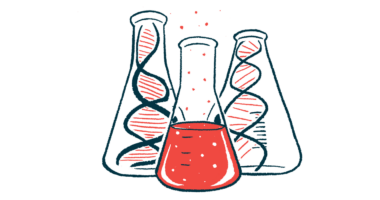Gene therapy targeting T-cells shows promise in myeloma animal models
Kelonia working on off the shelf but effective CAR T-cell therapy

A gene therapy designed by Kelonia Therapeutics to work as an off-the-shelf or readily available CAR T-cell therapy for multiple myeloma showed early signs of safety and efficacy in mouse models of the disease and in non-human primates.
Specifically, in a mouse model, CAR T-cells generated in vivo, or within a living organism — with a single, low dose of the therapy — showed prolonged anti-cancer function compared with standard CAR T-cell therapy.
The experimental gene therapy was developed with the Kelonia’s in vivo Gene Placement System (iGPS) technology,
In contrast to traditional CAR T-cell therapy, the company’s approach does not require time-consuming manufacturing of CAR T-cells in the lab. Nor is it necessary for patients to undergo pre-treatment T-cell depleting chemotherapy, which is linked to toxicities.
The new preclinical results were shared by Shannon Grande Contrastano, PhD, director of preclinical research at Kelonia, in an oral presentation during the 26th Annual Meeting of the American Society of Gene & Cell Therapy, held May 16-20 in Los Angeles. The presentation was titled “Potent In Vivo Transduction by iGPS Particles Generates CAR T Cells with Durable Anti-Tumor Activity.”
Kelonia’s iGPS technology used in its CAR T-cell therapy
Kelonia officials say they are eager to test the therapy in clinical trials.
“Cancer patients are waiting for an incredibly effective medicine without the severe toxicities or complicated manufacturing that have limited the accessibility and impact of existing CAR T cell therapies,” Kevin Friedman, PhD, founder, president, and chief scientific officer at Kelonia, said in a company press release.
“We’ve shown compelling preclinical evidence that achieving this transformative treatment for multiple myeloma is possible with Kelonia’s iGPS technology, and we look forward to sharing additional information as we progress towards the clinic,” Friedman said.
Traditional CAR T-cell therapy is a type of immunotherapy in which a patient’s own T-cells — immune cells with anti-cancer activity — are collected and engineered ex vivo, or in the lab, to recognize and eliminate cancer cells.
This is done by introducing a gene into the cells’ genome that instructs them to produce a lab-made chimeric antigen receptor, or CAR, that’s specifically designed to recognize a protein in cancer cells. The cells are then expanded and injected back into the patient’s blood.
While these patient-derived, or autologous, CAR T-cell therapies have shown promise in multiple cancer types, researchers aren’t always able to collect enough cells from a patient to create the treatment. Also, the development and expansion of CAR T-cells requires time the person with multiple myeloma often does not have.
Donor-derived, or allogeneic, approaches can speed the manufacturing process, but so far, these off-the-shelf approaches have shown inferior efficacy, according to Kelonia.
Kelonia’s iGPS platform bypasses the need to collect and modify the cells in the lab, instead performing the genetic modification of T-cells in the patient’s body. Moreover, this approach does not require patients to undergo the lymphodepleting chemotherapy regimen that works to eliminate the patient’s T-cells and create room for the engineered cells.
The iGPS-based gene therapy uses a harmless lentivirus, commonly used as a vehicle for gene delivery. It was tweaked to enhance its ability to deliver the target gene to T-cells inside the patient’s own body.
Animals ‘completely protected’ against tumor challenge with therapy
The newly presented results at the conference concerned Kelonia’s gene therapy, which was designed to deliver to T-cells a gene that codes for a CAR against the B cell maturation antigen (BCMA). This protein is present in large amounts on the surface of myeloma cells.
In mice genetically modified to have human-like features, researchers used a single, low-dose, into-the-vein (intravenous) infusion of the iGPS lentiviral particles. This was shown to be superior to standard lentivirus particles at genetically modifying T-cells (1.9% vs. 0.27%).
“These data indicate iGPS … modifications drive efficient in vivo [gene delivery] and preferential outgrowth of T cells,” the researchers wrote.
In a mouse model of multiple myeloma, complete cancer regression was possible at the lowest dose level tested — that of 10 million lentiviral particles. Also, a single dose of 25 million particles resulted in complete tumor control when compared with animals infused with CAR T-cells generated using standard ex vivo methods.
To assess the sustained efficacy of the CAR T-cells generated in vivo with iGPS particles, researchers infused myeloma cells back into the mice about two weeks after the tumor was cleared.
All animals treated with iGPS particles were “completely protected” against the second tumor challenge, while “animals treated with ex vivo-generated CAR T cells showed tumor progression,” the researchers wrote.
Additional analyses in the mice with human-like features were conducted one week after the iGPS infusion to assess the therapy’s targeting of T-cells across organs. They also evaluated its potential off-target effects, meaning the unintentional targeting of other cells.
Analysis of several organs showed an average of 3.9% of CAR T-cells in the blood and 14% in the spleen. The presence of lentivirus particles in other tissues was limited to phagocytes such as Kupffer cells in the liver, a type of immune cell that consumes or eats microbes, “which are expected to nonspecifically take up iGPS particles,” the team wrote.
“In both mice and non-human primates, therapeutic dose levels of iGPS particles specifically [targeted] T cells and showed no evidence of unexpected ‘off-target’ [gene modification], including progenitor cells or in vital and reproductive organs,” the company stated in the release.
In just over a year since launching, the … Kelonia team has shown the potential of our iGPS technology to provide precise, efficient, and safe CAR gene delivery directly to multiple myeloma patients intravenously and as an off-the-shelf therapy that doesn’t require preparative chemotherapy for potent CAR T cell activity.
In addition, the company detailed the results of treatment with different doses of iGPS particles delivering a gene coding for a CAR against CD20, another protein highly present in myeloma cells. The therapy led to a potent CAR T-cell response in non-human primates.
No preparative chemotherapy regimen was needed, and no evidence of toxicities were observed, including at the highest dose level, according to the press release.
“In just over a year since launching, the … Kelonia team has shown the potential of our iGPS technology to provide precise, efficient, and safe CAR gene delivery directly to multiple myeloma patients intravenously and as an off-the-shelf therapy that doesn’t require preparative chemotherapy for potent CAR T cell activity,” Friedman said.








